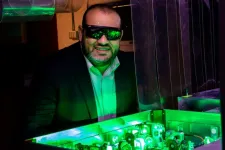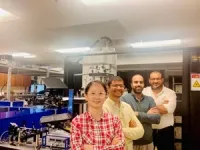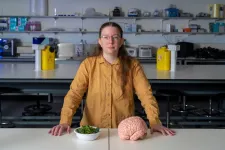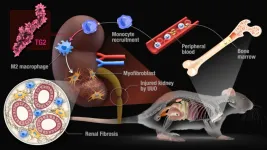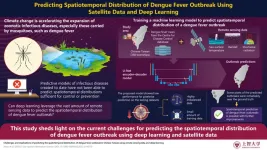(Press-News.org) Imagine a home computer operating 1 million times faster than the most expensive hardware on the market. Now, imagine that level of computing power as the industry standard. University of Arizona researchers hope to pave the way for that reality using light-based optical computing, a marked improvement from the semiconductor-based transistors that currently run the world.
"Semiconductor-based transistors are in all of the electronics that we use today," said Mohammed Hassan, assistant professor of physics and optical sciences. "They're part of every industry – from kids' toys to rockets – and are the main building blocks of electronics."
Hassan lad an international team of researchers that published the research article "Ultrafast optical switching and data encoding on synthesized light fields" in Science Advances in February. UArizona physics postdoctoral research associate Dandan Hui and physics graduate student Husain Alqattan also contributed to the article, in addition to researchers from Ohio State University and the Ludwig Maximilian University of Munich.
Semiconductors in electronics rely on electrical signals transmitted via microwaves to switch – either allow or prevent – the flow of electricity and data, represented as either "on" or "off." Hassan said the future of electronics will be based instead on using laser light to control electrical signals, opening the door for the establishment of "optical transistors" and the development of ultrafast optical electronics.
Since the invention of semiconductor transistors in the 1940s, technological advancement has centered on increasing the speed at which electric signals can be generated – measured in hertz. According to Hassan, the fastest semiconductor transistors in the world can operate at a speed of more than 800 gigahertz. Data transfer at that frequency is measured at a scale of picoseconds, or one trillionth of a second.
Computer processing power has increased steadily since the introduction of the semiconductor transistor, though Hassan said one of the primary concerns in developing faster technology is that the heat generated by continuing to add transistors to a microchip would eventually require more energy to cool than can pass through the chip.
In their article, Hassan and his collaborators discuss using all-optical switching of a light signal on and off to reach data transfer speeds exceeding a petahertz, measured at the attosecond time scale. An attosecond is one quintillionth of a second, meaning the transfer of data 1 million times faster than the fastest semiconductor transistors.
While optical switches were already shown to achieve information processing speeds faster than that of semiconductor transistor-based technology, Hassan and his co-authors were able to register the on and off signals from a light source happening at the scale of billionths of a second. This was accomplished by taking advantage of a characteristic of fused silica, a glass often used in optics. Fused silica can instantaneously change its reflectivity, and by using ultrafast lasers, Hassan and his team were able to register changes in a light's signal at the attosecond time scale. The work also demonstrated the possibility of sending data in the form of "one" and "zero" representing on and off via light at previously impossible speeds.
"This new advancement would also allow the encoding of data on ultrafast laser pulses, which would increase the data transfer speed and could be used in long-distance communications from Earth into deep space," Hassan said. "This promises to increase the limiting speed of data processing and information encoding and open a new realm of information technology."
The project was funded by a $1.4 million grant awarded to Hassan in 2018 by the Gordon and Betty Moore Foundation, an organization that aims "to create positive outcomes for future generations" by supporting research into scientific discovery, environmental conservation and patient care. The article was also based on work supported by the United States Air Force Office of Scientific Research's Young Investigator Research Program.
END
Optical switching at record speeds opens door for ultrafast, light-based electronics and computers
University of Arizona physicists led an international team in achieving optical switching of a light signal at attosecond speeds to reach previously unattainable data transfer speeds. An attosecond is one quintillionth of a second.
2023-03-23
ELSE PRESS RELEASES FROM THIS DATE:
Depressed, and aging fast
2023-03-23
Older adults with depression are actually aging faster than their peers, UConn Center on Aging researchers report.
“These patients show evidence of accelerated biological aging, and poor physical and brain health,” which are the main drivers of this association, says Breno Diniz, a UConn School of Medicine geriatric psychiatrist and author of the study, which appears in Nature Mental Health on March 22.
Diniz and colleagues from several other institutions looked at 426 people with late-in-life ...
Study finds “considerable uncertainty” around effectiveness and safety of analgesics for low back pain
2023-03-23
Despite nearly 60 years of research, there is still a lack of high certainty evidence on the effectiveness and safety of commonly used painkillers (analgesics) for short bouts of low back pain, finds an analysis of the evidence published by The BMJ.
The researchers say that until higher quality trials comparing analgesics with each other are published, “clinicians and patients are advised to take a cautious approach to manage acute non-specific low back pain with analgesic medicines.”
Analgesics such as paracetamol, ibuprofen, and codeine ...
Ending GP performance pay in Scotland linked to decline in quality of some care
2023-03-23
Ending performance related payments for NHS GPs in Scotland was associated with a decline in the quality of some aspects of care compared with England where financial incentives have continued, finds a study published by The BMJ today.
The researchers say further research is needed to better understand the full impact of withdrawal and the accompanying refocusing of quality improvement resources.
The NHS Quality and Outcomes Framework (QOF) pay-for-performance scheme began in 2004. It was designed to remunerate general practices for providing good quality care across a range of key areas such as cancer, diabetes, heart disease, mental health, and obesity.
In 2016, Scotland abolished ...
CHOP researchers develop first-of-its-kind prediction model for newborn seizures
2023-03-23
Philadelphia, March 22, 2023 – Researchers from the Neuroscience Center at Children’s Hospital of Philadelphia (CHOP) have developed a prediction model that determines which newborn babies are likely to experience seizures in the Neonatal Intensive Care Unit (NICU). This model could be incorporated into routine care to help the clinical team decide which babies will need electroencephalograms (EEGs) and which babies can be safely managed in the Neonatal Care Unit without monitoring through EEGs. This would allow families and providers to care for babies ...
A higher dose of magnesium each day keeps dementia at bay
2023-03-23
More magnesium in our daily diet leads to better brain health as we age, according to scientists from the Neuroimaging and Brain Lab at The Australian National University (ANU).
The researchers say increased intake of magnesium-rich foods such as spinach and nuts could also help reduce the risk of dementia, which is the second leading cause of death in Australia and the seventh biggest killer globally.
The study of more than 6,000 cognitively healthy participants in the United Kingdom aged 40 to 73 found ...
2022 heatwave struck off surgery in fifth of UK hospitals
2023-03-23
The 2022 summer heatwave resulted in a fifth of UK hospitals being forced to cancel operations during the three days when temperatures soared, a new study reveals.
Had the high temperatures continued, a further third of hospitals would have had to cancel surgery, as NHS buildings are not set up to withstand dangerously high temperatures.
The team surveyed surgeons, anaesthetists, and critical care doctors working during the heatwave of 16 – 19 July 2022.
They received 271 responses from 140 UK hospitals with one in five ...
British Ecological Society calls for greater funding for ecological research and sets out research agenda for next 25 years
2023-03-23
Two landmark reports published today (23 March) by the British Ecological Society reveal that ecological sciences are losing out on funding compared to other sciences. The reports also set out a research agenda for ecology over the next 25 years.
With the twin crises of climate change and biodiversity loss, an ecological understanding of the world has never been more pivotal to the future of humanity and all life on Earth.
To further this ecological understanding and highlight the importance of ecology to our future, the British ...
At least 80% of the world’s most important sites for biodiversity on land currently contain human developments, study finds
2023-03-23
PRESS RELEASE FROM THE UNIVERSITY OF CAMBRIDGE
EMBARGOED UNTIL 00.05 LONDON TIME (GMT) ON 23 March 2023
Paper available at: https://drive.google.com/drive/folders/18wVryz17-8PmtYDudp5NPXE75onO12FF?usp=sharing
At least 80% of the world’s most important sites for biodiversity on land currently contain human developments, study finds
At least 80% of sites identified as being internationally important for biodiversity on land currently contain infrastructure − of which more than 75% contain roads.
In the future, more sites that are important for biodiversity could contain powerplants, mines ...
Enzyme-regulating macrophages found in both humans and mice open the door to translating findings in mice into human therapies.
2023-03-23
Researchers at Nagoya University in Japan have identified two enzymes that are involved in macrophage polarization, one of the key factors affecting fibrosis. The group’s findings, reported in Cell Death & Disease, suggest a potential treatment for human patients.
Kidney fibrosis is a dangerous inflammatory disease that causes the organs to stiffen and lose normal function. The disease is linked to a process called macrophage polarization. Polarization is the process by which macrophages, the white blood cells that help the body fight infection and repair tissue, are changed into two types as a response to changes in the microenvironment of the cell: the M1 type, which ...
Can artificial intelligence predict spatiotemporal distribution of dengue fever outbreaks with remote sensing data? New study finds answers
2023-03-23
Outbreaks of zoonotic diseases, which are those transmitted from animals to humans, are globally on the rise owing to climate change. In particular, the spread of diseases transmitted by mosquitoes is very sensitive to climate change, and Chinese Taiwan has seen a worrisome increase in the number of cases of dengue fever in recent years.
Like for most known diseases, the popular saying “an ounce of prevention is worth a pound of cure” also rings true for dengue fever. Since there is still no safe and effective vaccine for all on a global scale, dengue fever prevention efforts rely on limiting places where mosquitoes can lay their eggs and giving people an early warning when ...
LAST 30 PRESS RELEASES:
Political polarization can spur CO2 emissions, stymie climate action
Researchers develop new strategy for improving inverted perovskite solar cells
Yes! The role of YAP and CTGF as potential therapeutic targets for preventing severe liver disease
Pancreatic cancer may begin hiding from the immune system earlier than we thought
Robotic wing inspired by nature delivers leap in underwater stability
A clinical reveals that aniridia causes a progressive loss of corneal sensitivity
Fossil amber reveals the secret lives of Cretaceous ants
Predicting extreme rainfall through novel spatial modeling
The Lancet: First-ever in-utero stem cell therapy for fetal spina bifida repair is safe, study finds
Nanoplastics can interact with Salmonella to affect food safety, study shows
Eric Moore, M.D., elected to Mayo Clinic Board of Trustees
NYU named “research powerhouse” in new analysis
New polymer materials may offer breakthrough solution for hard-to-remove PFAS in water
Biochar can either curb or boost greenhouse gas emissions depending on soil conditions, new study finds
Nanobiochar emerges as a next generation solution for cleaner water, healthier soils, and resilient ecosystems
Study finds more parents saying ‘No’ to vitamin K, putting babies’ brains at risk
Scientists develop new gut health measure that tracks disease
Rice gene discovery could cut fertiliser use while protecting yields
Jumping ‘DNA parasites’ linked to early stages of tumour formation
Ultra-sensitive CAR T cells provide potential strategy to treat solid tumors
Early Neanderthal-Human interbreeding was strongly sex biased
North American bird declines are widespread and accelerating in agricultural hotspots
Researchers recommend strategies for improved genetic privacy legislation
How birds achieve sweet success
More sensitive cell therapy may be a HIT against solid cancers
Scientists map how aging reshapes cells across the entire mammalian body
Hotspots of accelerated bird decline linked to agricultural activity
How ancient attraction shaped the human genome
NJIT faculty named Senior Members of the National Academy of Inventors
App aids substance use recovery in vulnerable populations
[Press-News.org] Optical switching at record speeds opens door for ultrafast, light-based electronics and computersUniversity of Arizona physicists led an international team in achieving optical switching of a light signal at attosecond speeds to reach previously unattainable data transfer speeds. An attosecond is one quintillionth of a second.
